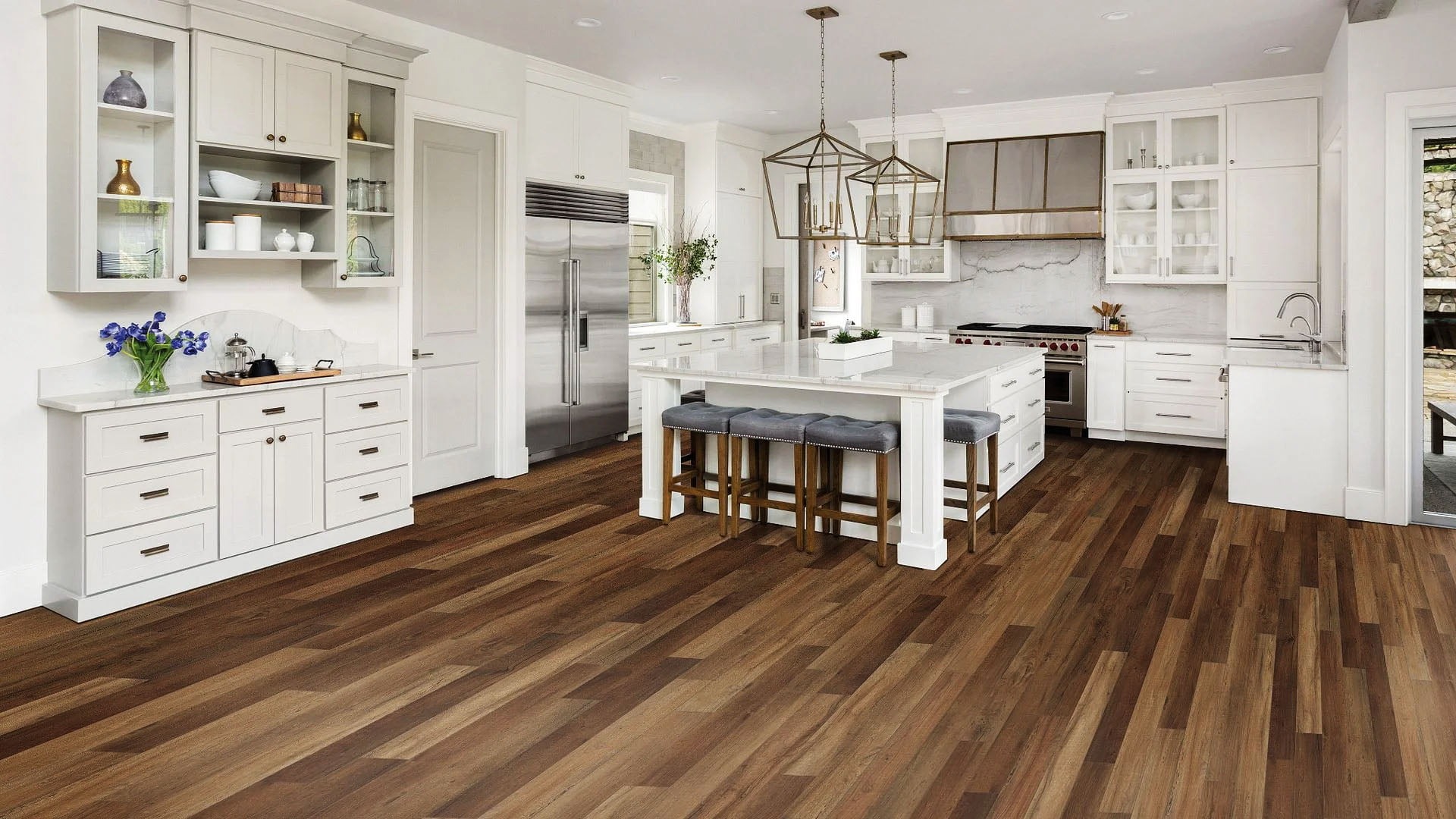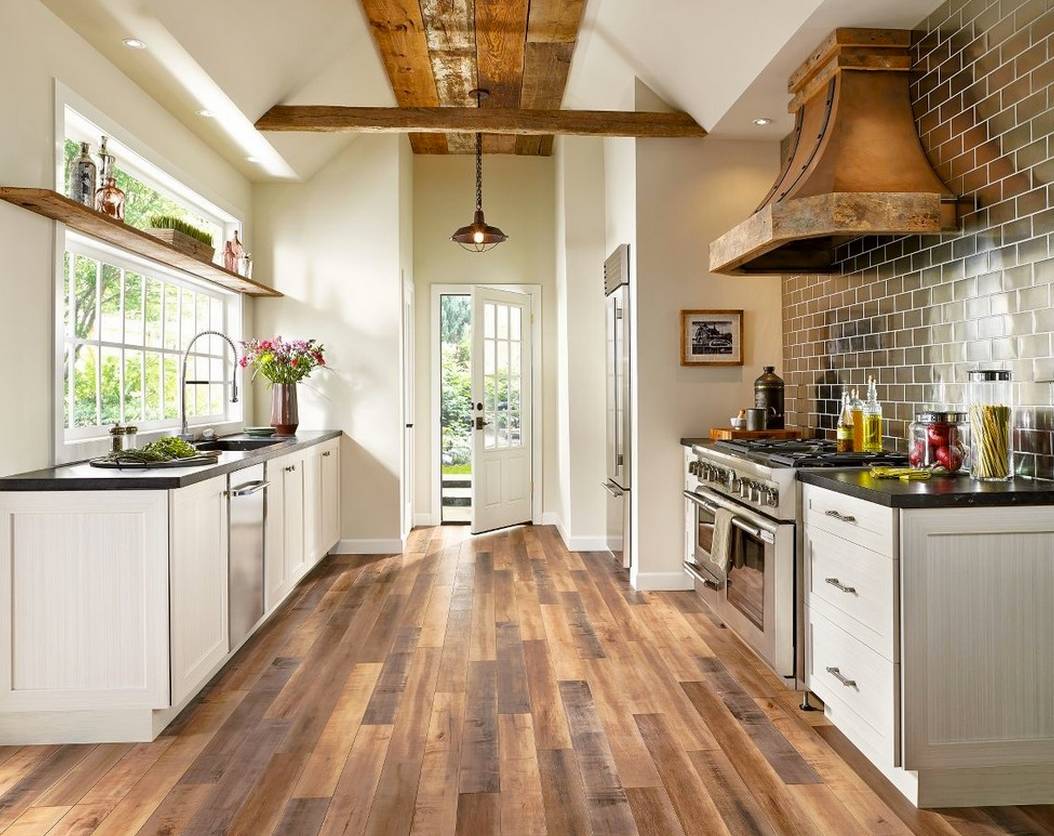
Kitchen Flooring Options: Hardwood, Tile, or Vinyl?
Introduction
When planning a kitchen remodel, flooring is one of the most important decisions you’ll make. It sets the tone for the room’s style, durability, and comfort. Among the most popular choices are hardwood, tile, and vinyl — each offering unique benefits, costs, and maintenance requirements.
This article explores these three kitchen flooring options in depth, using data and real examples to help you choose the best fit for your Fort Worth home. At Salvation Home Remodeling, our kitchen remodeling services include flooring consultation, design, and installation, so you can make confident, lasting choices.
Why Kitchen Flooring Matters
A kitchen isn’t just a cooking area — it’s a high-traffic, high-impact space that demands flooring built for performance and beauty.
According to the National Association of Home Builders (NAHB), the kitchen is one of the most frequently updated rooms in American homes, and flooring ranks among the top three features homeowners prioritize.
In addition, the 2024 Remodeling Cost vs. Value Report shows that kitchen remodels with quality flooring upgrades can recoup around 70% of their cost upon resale.
Good flooring also impacts comfort, safety, and long-term maintenance — especially in humid climates like Fort Worth, Texas, where material performance under moisture and temperature changes matters.
Overview: Hardwood vs. Tile vs. Vinyl
| Feature | Hardwood | Tile | Vinyl |
|---|---|---|---|
| Material Type | Natural wood | Ceramic or porcelain | Synthetic composite |
| Durability | Long-lasting (if maintained) | Extremely durable | Good for heavy use |
| Moisture Resistance | Moderate | Excellent | Excellent |
| Comfort | Warm and soft underfoot | Hard and cool | Softer than tile |
| Maintenance | Needs refinishing & sealing | Easy to clean | Easiest to maintain |
| Average Cost | $8–$15/sq ft | $7–$12/sq ft | $3–$8/sq ft |
| Lifespan | 20–50 years | 50+ years | 10–20 years |
Each option brings a balance of aesthetics, performance, and cost — the best choice depends on your kitchen’s layout, lifestyle, and budget.
1. Hardwood Flooring: Classic and Timeless
Aesthetic & Feel
Hardwood floors bring warmth, elegance, and natural beauty unmatched by other materials. They seamlessly connect kitchens with adjacent rooms, especially in open-concept layouts common in Fort Worth homes.
Popular species include oak, maple, hickory, and walnut, each offering distinct grain and tone variations. Engineered hardwood — with a real wood veneer on a stable core — has become increasingly popular for its moisture resistance.
Durability & Maintenance
Solid hardwood can last decades with proper care but is vulnerable to water and humidity. It requires refinishing every 8–10 years to maintain shine and protection.
To prevent warping or staining:
-
Wipe spills immediately.
-
Avoid excessive moisture when cleaning.
-
Use mats near sinks and dishwashers.
According to the National Wood Flooring Association (NWFA), refinished hardwood floors can last over 100 years if maintained properly.
Cost & Installation
-
Material: $5–$10/sq ft (engineered), $8–$15/sq ft (solid)
-
Installation: $3–$6/sq ft
-
Lifespan: 25–50 years
Installation should be handled by professionals to ensure proper subfloor preparation and sealing — something our general contracting team handles with precision.
Pros
✅ Increases home value
✅ Natural and timeless look
✅ Can be refinished multiple times
Cons
❌ Susceptible to water and humidity damage
❌ Higher cost than vinyl or laminate
❌ Requires ongoing maintenance
2. Tile Flooring: Durable and Water-Resistant
Aesthetic & Types
Tile flooring whether ceramic, porcelain, or natural stone — remains a favorite for kitchens because of its strength and variety.
Porcelain tile, fired at higher temperatures, is denser and more moisture-resistant than ceramic. Natural stone tiles such as travertine or slate offer a luxurious appearance but need sealing.
Design options are virtually limitless — from wood-look tiles to modern matte finishes.
Durability & Maintenance
Tile flooring is highly durable and water-resistant, making it ideal for kitchens with heavy traffic or frequent spills. It resists scratches, dents, and stains better than most flooring types.
However, grout maintenance is essential. Without sealing, grout can absorb moisture or discolor over time.
Regular sweeping and mopping with mild cleaners keep tile floors looking new for decades.
Cost & Installation
-
Material: $3–$10/sq ft (ceramic), $4–$12/sq ft (porcelain), $7–$20/sq ft (stone)
-
Installation: $5–$10/sq ft
-
Lifespan: 50+ years
Tile installation requires professional handling to ensure level subfloors and precise grout spacing — available through our remodeling services.
Pros
✅ Waterproof and heat-resistant
✅ Long lifespan
✅ Variety of design options
Cons
❌ Hard and cold underfoot
❌ Grout can stain if not sealed
❌ Can chip if heavy objects fall

3. Vinyl Flooring: Affordable and Versatile
Aesthetic & Types
Vinyl has evolved far beyond its early reputation. Modern Luxury Vinyl Plank (LVP) and Luxury Vinyl Tile (LVT) closely mimic wood and stone textures with impressive realism.
It’s available in plank, tile, or sheet forms, and comes with waterproof cores that make it perfect for moisture-prone kitchens.
Durability & Maintenance
Vinyl is one of the easiest flooring types to maintain. It resists water, stains, and scratches and doesn’t require waxing or refinishing.
High-quality LVP flooring can withstand heavy foot traffic and is softer underfoot than tile.
To prolong life:
-
Use felt pads on furniture.
-
Clean with mild detergent and water.
-
Avoid dragging heavy items.
Cost & Installation
-
Material: $2–$6/sq ft
-
Installation: $1.50–$4/sq ft
-
Lifespan: 10–20 years
Installation is quick and affordable — ideal for homeowners seeking an upgrade without full renovation.
Pros
✅ Budget-friendly
✅ Waterproof
✅ Easy to install and replace
✅ Low maintenance
Cons
❌ Shorter lifespan
❌ Can fade with UV exposure
❌ Not as eco-friendly as natural materials
Comparing Durability and Moisture Resistance
| Condition | Hardwood | Tile | Vinyl |
|---|---|---|---|
| High Foot Traffic | Moderate | Excellent | Excellent |
| Water & Spills | Vulnerable | Resistant | Waterproof |
| Heat Resistance | Good | Excellent | Good |
| Scratch Resistance | Fair | Excellent | Very Good |
| Comfort | Warm, soft | Hard, cool | Softer |
| Maintenance | Moderate | Easy | Very Easy |
In Fort Worth’s humid climate, vinyl and tile generally perform better against moisture, while engineered hardwood remains viable if properly sealed.
Style and Resale Value
According to Zillow Consumer Housing Trends (2023), homes with hardwood or tile floors in kitchens tend to sell faster and above the listing price compared to those with laminate or outdated vinyl.
However, vinyl’s cost-efficiency makes it appealing for rental properties and budget remodels.
Each material’s visual appeal can enhance different design goals:
-
Hardwood: Warm, elegant, timeless
-
Tile: Clean, modern, durable
-
Vinyl: Affordable, customizable, practical
🔗 For design inspiration, visit our Kitchen Remodeling Services section.
Cost and ROI (Return on Investment)
| Flooring Type | Average Cost (Installed) | ROI at Resale | Maintenance Cost/Year |
|---|---|---|---|
| Hardwood | $8–$15 per sq ft | 70–80% | Medium |
| Tile | $7–$12 per sq ft | 65–75% | Low |
| Vinyl | $3–$8 per sq ft | 50–60% | Very Low |
In most Fort Worth neighborhoods, hardwood offers the best resale return, while vinyl provides the best short-term savings for homeowners focused on practicality.
Installation Considerations
Subfloor Prep
Uneven subfloors cause cracking in tile and warping in hardwood. Professionals ensure proper leveling and underlayment.
Underlayment
-
Hardwood requires moisture barriers.
-
Tile needs cement backer boards.
-
Vinyl uses foam underlayment for comfort.
Maintenance Plan
We always guide clients on post-install care — including refinishing schedules for wood or sealing cycles for tile.
Learn more about our installation process under General Contracting Services.
Sustainability & Environmental Factors
-
Hardwood: Renewable and biodegradable when sourced responsibly (FSC-certified).
-
Tile: Natural but energy-intensive to produce.
-
Vinyl: Synthetic, but modern options are recyclable and low-VOC.
Choosing locally sourced or certified materials reduces environmental impact and supports Texas suppliers.
How Salvation Home Remodeling Helps
At Salvation Home Remodeling, we provide:
-
In-depth flooring consultations during remodel planning
-
Material selection based on budget and lifestyle
-
Professional installation for all flooring types
-
Moisture protection and sealing for longevity
-
Full design-build remodeling for kitchens and bathrooms
We’re your trusted Fort Worth remodeling contractor, offering end-to-end solutions from design to delivery.
Explore our:
FAQs
Q1: Which kitchen flooring is best overall?
A: For longevity and value, hardwood leads. For durability and moisture resistance, tile excels. For affordability and flexibility, vinyl wins.
Q2: Can hardwood floors handle kitchen moisture?
A: Yes, if properly sealed and maintained. Engineered hardwood performs better than solid in humid areas like Fort Worth.
Q3: What’s the most budget-friendly option?
A: Vinyl flooring offers the lowest cost and easiest installation.
Q4: How long will each flooring type last?
A: Tile lasts the longest (50+ years), hardwood 25–50, vinyl 10–20 years.
Q5: Should I install flooring before or after cabinets?
A: Typically, flooring is installed before base cabinets for a seamless look — especially for tile and vinyl.
Conclusion
Choosing between hardwood, tile, or vinyl flooring comes down to lifestyle, budget, and long-term goals. Hardwood adds elegance and resale value, tile offers durability and moisture protection, and vinyl provides comfort and cost efficiency.
At Salvation Home Remodeling, we help Fort Worth homeowners make confident flooring decisions backed by expert advice, premium materials, and skilled craftsmanship.
Ready to begin your remodel? Explore our Kitchen Remodeling Services or get a free estimate through our Contact Page.
Ready to upgrade your kitchen flooring? Contact SHR Tarrant for expert kitchen remodeling in Fort Worth. We help you choose the perfect flooring material and handle professional installation from start to finish.
